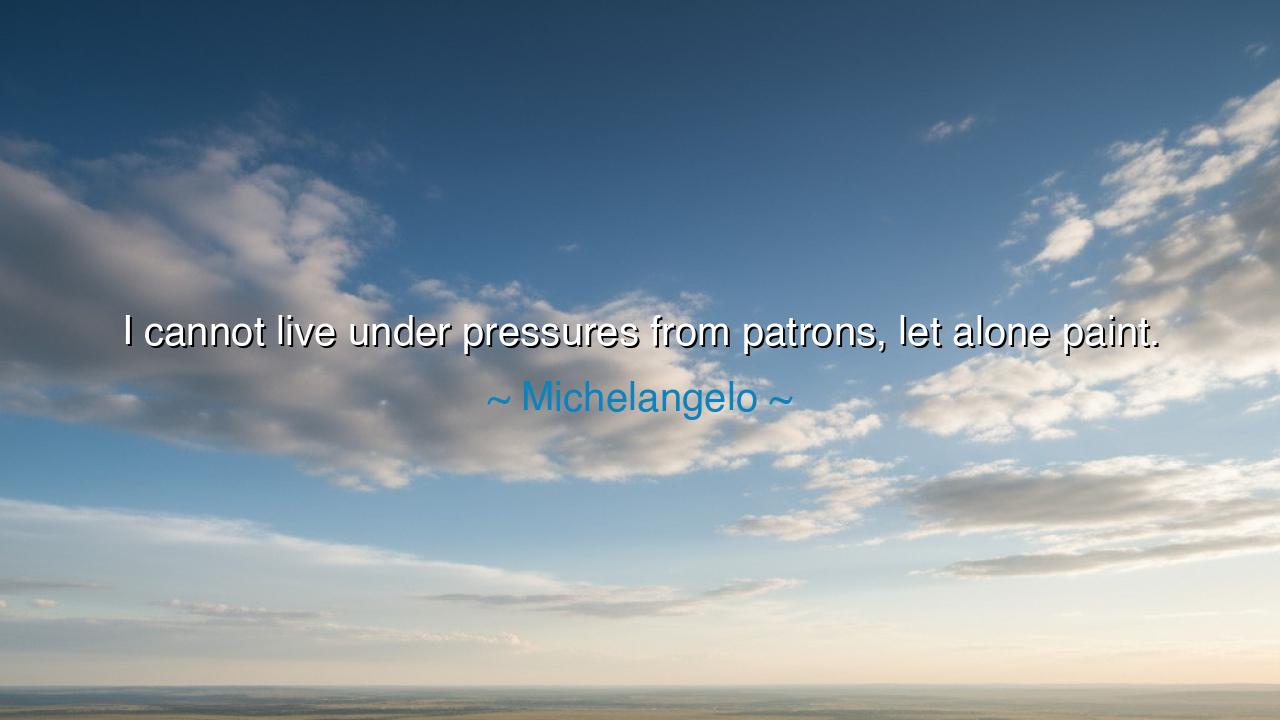
I cannot live under pressures from patrons, let alone paint.






"I cannot live under pressures from patrons, let alone paint." These powerful words from Michelangelo encapsulate a deep truth about the creative spirit and the importance of artistic freedom. Michelangelo, one of the most celebrated artists of the Renaissance, understood that true artistic expression cannot thrive under the weight of external expectations, particularly those imposed by patrons who sought to influence or dictate the course of his work. The very act of creation, whether in painting, sculpture, or any form of artistic endeavor, requires a space of freedom—a place where the artist can follow their own vision without the oppressive burden of outside pressure. To create is to be deeply connected with one’s inner self, and it is this inner voice that must guide the hand, not the demands of others.
In the ancient world, the concept of artistic freedom was often intertwined with the notion of divine inspiration. Plato, in his Republic, spoke of the artist as a vessel for the divine, one who channels the eternal forms into tangible representations in the physical world. The artist, for Plato, must not be constrained by the mundane or the material, but instead should be free to seek and express the ideal. Similarly, Aristotle, in his writings on poetry and drama, emphasized that true art comes from a place of universal truth and internal understanding, not from the imposition of external forces. For the ancient thinkers, art was a form of self-expression that demanded the artist’s full devotion to their inner vision, free from the shackles of societal expectation or external pressure.
Michelangelo, like the philosophers of old, understood this deeply. His artistic genius, as seen in the Sistine Chapel or his David, emerged not from the influence of wealthy patrons, but from his own soul and the deep passion he held for his craft. His quote speaks to the immense inner struggle he must have faced as he sought to remain true to his artistic vision while simultaneously fulfilling the often demanding and limiting desires of those who funded his work. The tension between patronage and artistic integrity is not a new dilemma; it has echoed throughout the centuries in the lives of countless artists who have struggled to maintain their authenticity while navigating the pressures of commerce and public expectation.
This tension between external demands and personal vision is perhaps most vividly exemplified in the life of Vincent van Gogh, whose tumultuous relationship with his own artistic expression mirrored Michelangelo’s frustrations. Van Gogh, like Michelangelo, struggled against a world that did not understand his work, and often felt alienated by the demands placed on him. His mental health deteriorated under the weight of patronage and societal expectations, and yet, his greatest works—the Starry Night, Sunflowers, and many others—were born from his uncompromising vision. Van Gogh, much like Michelangelo, could not thrive under the pressure of others’ demands. His self-imposed isolation allowed him to create art that was true to his inner vision, free from the constraints of those who did not understand the depth of his craft.
The lesson in Michelangelo’s words is a reminder that true creativity and artistic expression are birthed from freedom—the freedom to follow one’s own path without the burden of external expectations. When we are forced to conform to the desires of others, whether in our work, relationships, or personal lives, we risk losing touch with the truth that lies within us. Like Michelangelo, Van Gogh, and countless others, we must find the courage to create freely, to follow our own intuition, and to embrace the tension that may come with standing alone in our vision. It is only when we are free to act on our own beliefs that we can truly create work that speaks from the heart and resonates deeply with the world around us.
In our own lives, we must strive to maintain a balance between the pressures of the outside world and our inner voice. While patrons and societal expectations may play a role in shaping our actions, we must not allow them to overpower the authenticity of our own beliefs. Whether we are artists, business leaders, or simply individuals trying to live with purpose, the key is to stay true to our own vision, and to trust that our unique path will lead to something of value. Michelangelo’s words encourage us to honor our individuality and to protect the freedom that is necessary for true creativity to flourish.
Let us, then, seek to create space for our authenticity and self-expression, even in a world that often demands conformity. Like Michelangelo, we must find the courage to stand alone when necessary, to protect our vision, and to believe in the power of our own voice. Whether in our art, our work, or our personal lives, true fulfillment comes not from pleasing others, but from embracing the freedom to follow what is in our hearts. Through this, we can create lives of meaning, purpose, and lasting impact, just as Michelangelo did with his monumental contributions to art and culture.






AAdministratorAdministrator
Welcome, honored guests. Please leave a comment, we will respond soon